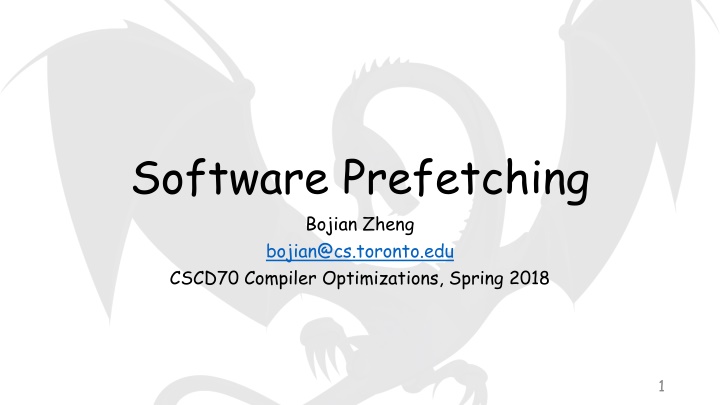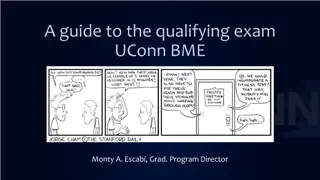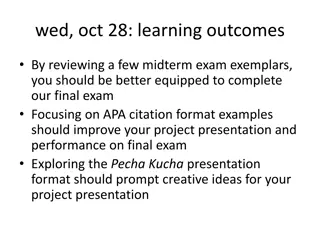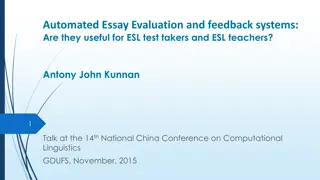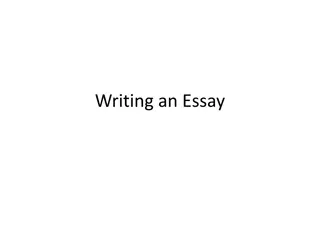Final Exam Format: Written Essay Questions on Code
This final exam format for Fall 2020 consists mainly of written essay questions on code variations from a public list. The exam structure includes multiple versions with different questions on the same or similar code. Students are advised to study in preparation, using examples and guidance from Bloch and Liskov, and to create plausible answers following specific instructions. The exam will be distributed online, allowing open-book and open-notes, with the option for an oral format as well.
Download Presentation

Please find below an Image/Link to download the presentation.
The content on the website is provided AS IS for your information and personal use only. It may not be sold, licensed, or shared on other websites without obtaining consent from the author.If you encounter any issues during the download, it is possible that the publisher has removed the file from their server.
You are allowed to download the files provided on this website for personal or commercial use, subject to the condition that they are used lawfully. All files are the property of their respective owners.
The content on the website is provided AS IS for your information and personal use only. It may not be sold, licensed, or shared on other websites without obtaining consent from the author.
E N D
Presentation Transcript
Software Prefetching Bojian Zheng bojian@cs.toronto.edu CSCD70 Compiler Optimizations, Spring 2018 1
Q & A Many good questions have already been asked on Piazza. Please go through them first before solving the assignment. Please ignore the Profiling sections for now, because it seems that the option stats is missing in lli (thanks to Stone Jin). Please name your pass loop-invariant-code-motion as licm seems to contradict with built-in LLVM pass (thanks to Lioudmila Tishkina). 3
Q & A Please write your test cases in do-while loop because special handling is required for for-loop and while-loop (thanks to Terrence Hung). Why? Consider the code on the right hand side: j = 5; for (i = 0; i < ???; ++i) j = 10; printf( %d , j); 4
Q & A Idea: Body statements are not guaranteed to execute, therefore cannot perform code motion. Need to perform the Landing-Pad Transformation first before LICM. j = 5; for (i = 0; i < ???; ++i) j = 10; printf( %d , j); 5
Landing-Pad Transformation Before After 6
Landing-Pad Transformation Before After j = 5; j = 5; i = 0; for (i = 0; i < ???; ++i) j = 10; if (i < ???) { // Landing-Pad do { j = 10; ++i } while (i < ???); } printf( %d , j); printf( %d , j); 7
Assignment 3 Hints 1. Compute Loop Invariants: 1) Traverse through the loop, and get all the definitions inside. 2) Create a mapping from Instruction to bool (isInvariant). Keep iterating until no changes to such mapping occurs. Mark instruction as isInvariant i.f.f. its operands have one of the following properties: (1) constant (2) definition definitions inside (3) definition definition inside but definition has already been marked as isInvariant. Do not forget to also include the additional constraints mentioned in the handout (isSafeToSpeculativelyExecute ). 8
Assignment 3 Hints 2. Compute Dominator Tree: Please refer to the tutorial demo on SSA on how this was done for Dominance Frontier. 3. Compute Loop Exit: llvm::Loop has built-in method call that tells you this. 9
Assignment 3 Hints 4. Compute candidates for Code Motion: Must be invariant. Must dominate exit blocks. Must have only one definition? No need to worry about this because of SSA. 5. Perform Code Motion: Move candidates to the Loop Preheader, if there exists. 10
Questions? 1. Compute Loop Invariants. 2. Compute Dominator Tree. 3. Compute Loop Exit 4. Compute candidates for Code Motion. 5. Perform Code Motion. 11
Software Prefetching Recall that in our last class, we mentioned the fundamental idea of prefetching move data close to the processor (e.g. cache) before it is needed. Need to answer the following two questions: (1) what to prefetch and (2) when & how to prefetch. 13
What to prefetch? Use Prefetch Predicate: Locality Analysis Prefetch Predicate (what to prefetch) Locality Analysis: Recall from last class that reuse localized = locality where reuseanswers the question under which condition are we going to access the exact same element (Temporal Locality) or elements of the same row (Spatial Locality), under the condition that cache is infinitely large ; localized is determined by how large our working set is compared with our cache size. 14
Recall: Locality Analysis double A[3][N], B[N][3]; A[i][j]: Spatial Locality on inner loop j B[j + 1][0]: Temporal Locality on outer loop i B[j][0]: Group Locality due to leading reference B[j + 1][0] for (i 0,3 ) for (j 0,? 1 ) A[i][j] = B[j][0] + B[j + 1][0]; // row-major, 2 elements per cache block, N is small (working set < cache size). 15
Miss Instances Need to understand the miss instances. What are the miss instances on A[i][j] and B[j + 1][0]? double A[3][N], B[N][3]; for (i 0,3 ) for (j 0,? 1 ) A[i][j] = B[j][0] + B[j + 1][0]; // row-major, 2 elements per cache block, N is small (working set < cache size). 16
Miss Instances Temporal Locality Consider B[j + 1][0], which has Temporal Locality on outer loop i. double A[3][N], B[N][3]; for (i 0,3 ) for (j 0,? 1 ) A[i][j] = B[j][0] + B[j + 1][0]; // row-major, 2 elements per cache block, N is small (working set < cache size). 17
Miss Instances Temporal Locality double A[3][N], B[N][3]; for (i 0,3 ) for (j 0,? 1 ) A[i][j] = B[j][0] + B[j + 1][0]; // row-major, 2 elements per cache block, N is small (working set < cache size). 18
Miss Instances Temporal Locality Consider B[j + 1][0], which has Temporal Locality on outer loop i. Misses happen during our 1st iteration of outer loop i. Therefore, predicate is true when i = 0. double A[3][N], B[N][3]; for (i 0,3 ) for (j 0,? 1 ) A[i][j] = B[j][0] + B[j + 1][0]; // row-major, 2 elements per cache block, N is small (working set < cache size). 19
Miss Instances Spatial Locality double A[3][N], B[N][3]; Consider A[i][j] which has Spatial Locality on inner loop j. for (i 0,3 ) for (j 0,? 1 ) A[i][j] = B[j][0] + B[j + 1][0]; // row-major, 2 elements per cache block, N is small (working set < cache size). 20
Miss Instances Spatial Locality double A[3][N], B[N][3]; for (i 0,3 ) for (j 0,? 1 ) A[i][j] = B[j][0] + B[j + 1][0]; // row-major, 2 elements per cache block, N is small (working set < cache size). 21
Miss Instances Spatial Locality double A[3][N], B[N][3]; Consider A[i][j] which has Spatial Locality on inner loop j. Misses happen every ? iteration of inner loop j (where ? denotes the # of elements per cache block). Therefore, predicate is true when j mod ? = 0. for (i 0,3 ) for (j 0,? 1 ) A[i][j] = B[j][0] + B[j + 1][0]; // row-major, 2 elements per cache block, N is small (working set < cache size). 22
Prefetch Predicate Locality None Temporal Spatial Miss Instances Every Iteration 1st Iteration Every ? Iteration Predicate true i = 0 i mod ? = 0 23
Prefetch Insertion Given that now we have Prefetch Predicate, how are we going to insert them? Consider the code on the right hand side: double a[100]; for (i 0,100 ) a[i] = 0; // 2 elements per cache block 24
Loop Splitting if Loop Unrolling double a[100]; double a[100]; for (i 0,100 ) if (i mod 2 == 0) a[i] = 0; for (i 0,100 , i += 2) // NO if is needed! prefetch a[i] = 0; a[i + 1] = 0; prefetch // 2 elements per cache block // 2 elements per cache block 25
Loop Splitting Idea: Isolate Miss Instances by Loop Splitting. Temporal Locality Misses on 1st Iteration Peel the 1st Iteration Spatial Locality Misses every ? Iteration Unroll by ? 26
Software Pipelining double a[100]; What should _____ be? a[i]? a[i + 2]? for (i 0,100 , i += 2) prefetch _____ a[i] = 0; a[i + 1] = 0; // 2 elements per cache block 27
Software Pipelining The answer depends on the relative ratio between memory access latency and shortest path through loop body. To fully hide the memory latency with execution, prefetch what is needed for the next mem exec iterations 28
Software Pipelining double a[100]; double a[100]; for (i 0,100 , i += 2) prefetch _____ a[i] = 0; a[i + 1] = 0; for (i 0,6 , i+= 2) // prologue prefetch a[i] for (i 0,94 , i += 2) // steady state prefetch a[i + 6] a[i] = 0; a[i + 1] = 0; // 2 elements per cache block for (i 94,100 , i += 2) // epilogue a[i] = 0; a[i + 1] = 0; mem exec= 6 // 2 elements per cache block, 29
Questions? Locality Analysis Miss Instances Prefetch Predicate Loop Splitting & Software Pipelining 30
